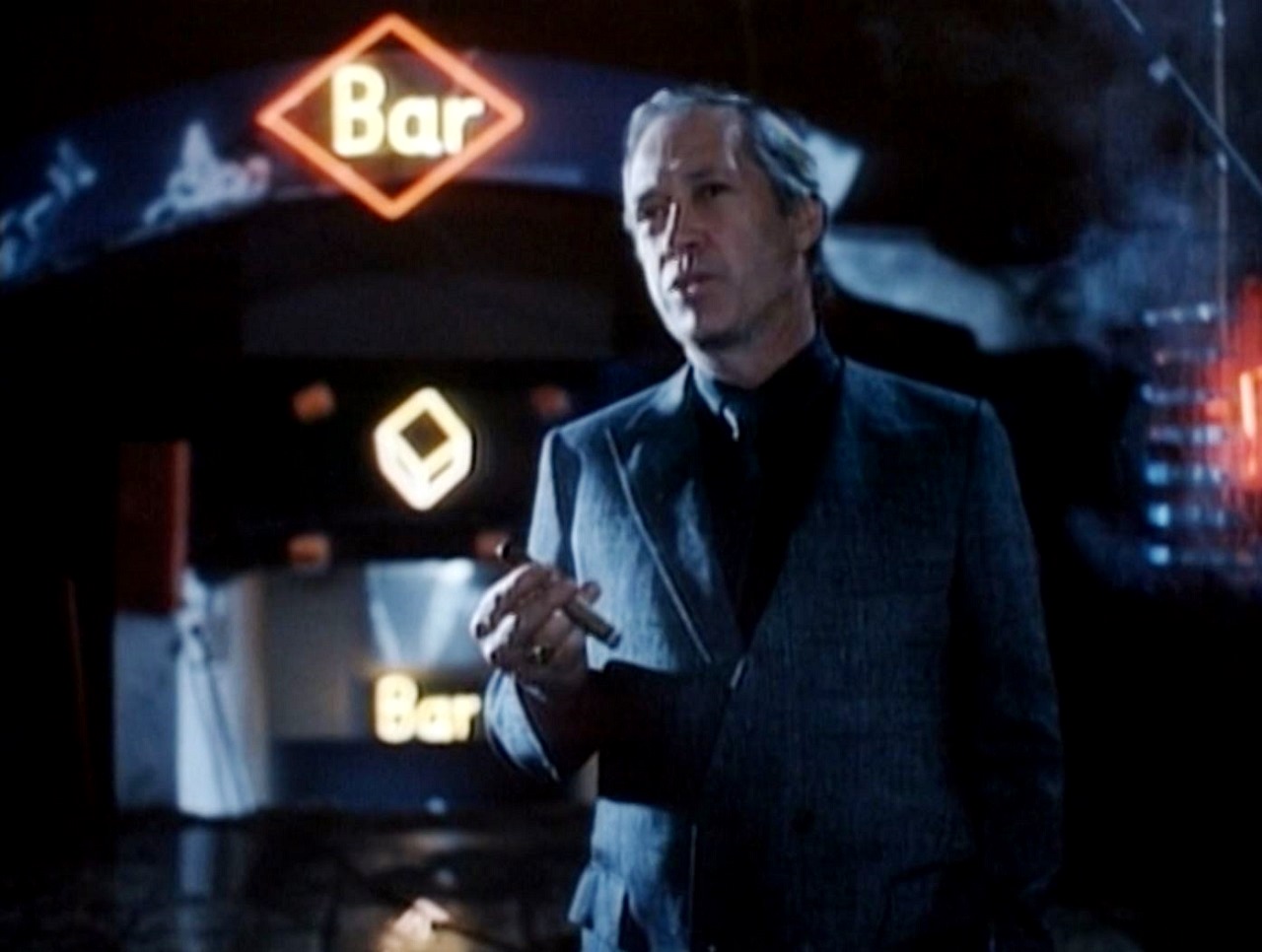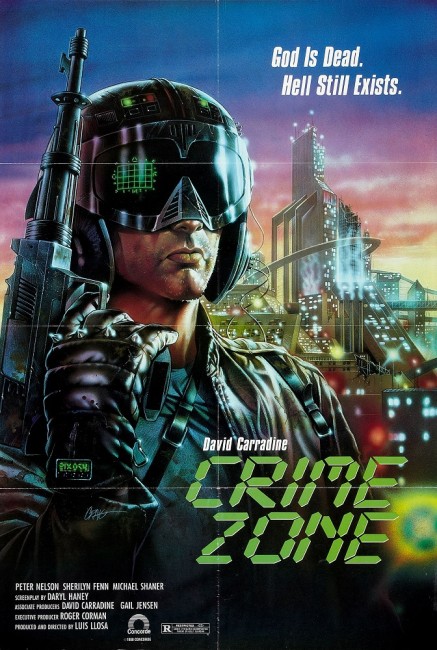Crew
Director/Producer – Luis Llosa, Screenplay – Daryl Haney, Photography – Cusi Barrio, Music – Rick Conrad, Special Effects – Fernando Vasquez De Velasco. Production Company – Concorde.
Cast
Peter Nelson (Bone), Sherilyn Fenn (Helen), David Carradine (Jason), Michael Shaner (Creon), Orlando Sacha (Alexi Mandela), Don Manor (J.D.)
Plot
In the totalitarian future city of Soleil, Bone, a security guard who has just been fired from his job, meets and falls in love with the prostitute Helen. A stranger Jason offers to get the two of them to freedom in the neighbouring democratic city of Frodan if they conduct a series of armed robberies for him. They agree but things go wrong and they instead end up hunted as fugitives by the police. Captured, they discover that Jason is in fact the city’s police chief – he has been so successful at wiping out criminals that he needs to recruit more in order to justify the existence of his force.
Ever since around 1980, the traditional dystopian science-fiction film – that is ideologically dark and oppressive futures, examples of which might include Fahrenheit 451 (1966), THX 1138 (1971), Zardoz (1974) and Rollerball (1975) – has become inextricably intertwined with the action film. In the majority of modern dystopian films – such as Mad Max (1979), The Last Chase (1980), The Running Man (1987), No Escape (1994) and this – the action is set in a rundown or oppressive future. Unlike the aforementioned classical dystopian scenarios, these films remain vague about the ideology behind it – the oppressive scenario has become so much a staple trope of the genre that it appears to no longer need any ideological explanation. (For a more detailed listing see Dystopias).
Little thought has gone into the scenario in Crime Zone and it often seems merely an array of generic oppressive elements without any underlying or consistent ideology – there is a police state, yet morality is lax and street crime appears to be tolerated; there are various anti-sex laws yet prostitution is legal. This however is not important – in the postmodern dystopian scenario, the totalitarian state is largely symbolic, standing in for the monolithic mass of controlling tyranny in everyday life, a symbolic ideology for the heroes of the piece to win their individuality against. This is why the action film, which is all about hard-fought individuality, has latched onto the dystopia so well.
Crime Zone is a peculiar film. It is a Roger Corman production and has been designed as a low-budget action hybrid – thus any pretensions it has should be regarded as a bonus rather than a failing. It does suffer from conceptually shabby scripting. Some of the character motivation gets extremely silly at times – it is hard to swallow that police chief David Carradine would set Peter Nelson and Sherilyn Fenn up simply because the police need criminals to keep their jobs going. Or that Michael Shaner would turn from being the hero’s best friend into a psychopath because simply Nelson fails to share a hooker with him. There is a priceless scene – one has no idea whether it is intentional or not – where the female cop bursts into Peter Nelson’s room suspecting to find him in flagrante delicto and in a thick accent demands: “I’ll bet you’re still horny, Sub-Grade – show me your dick … Is that its normal size?”

Whether intentionally or not, the background with its half-defined ideas about the social situation, its lack of ties to anything we can understand, creates an atmosphere of strangeness. What makes Crime Zone almost worthwhile is its interestingly nihilistic twist ending taken somewhat from George Orwell’s Nineteen Eighty-Four (1949) and its idea of the perpetual war to suppress the populace.
The production designer has tried to create a future that looks like an experiment in style that has gone wrong. Everything is decked out in neon, from the bars and brothels to the bedheads, the balls on the pool table and the spoilers on the cars – even the derelicts in the Plague Zone appear to drag portable neon lights around after them. However, with such overkill, the effect is more pretentious than it is futuristic. The production designer is also hamstrung by the film’s cheapness – the cryo-tubes in The Gardens of Hibernation are simply plastic sheets.
Among the cast, David Carradine gives an assured performance, easily the best in the film. Sherilyn Fenn, normally a vacant actress, is surprisingly good – her character comes tough and hard-bitten but with a forceful drive.
Peruvian-born director Luis Llosa later went onto direct action films such as Sniper (1993), the fine Stallone-Sharon Stone pairing The Specialist (1994) and then the campily awful monster movie Anaconda (1997).

